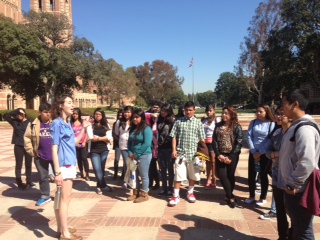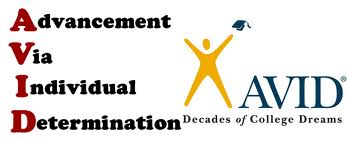AVID Site-Team Member
Overview
During the 2013-2014 academic year, I am a member of the AVID Site Team. The team consists of the AVID Elective Teachers for each grade level (9th-12th), the AVID college tutors, student representatives (two from each grade level), and the counselor.
AVID Site-Team Member Role
As a site team, we created our field plan during the Summer AVID Conference in San Diego prior to the start of the school year. The plan included our areas of focus based on the 11 AVID Essentials for the upcoming school year. This year’s areas of focus are:
- Essential 1: AVID student selection must focus on students in the middle, with academic potential,
 who would benefit from AVID support to improve their academic record and begin college preparation
who would benefit from AVID support to improve their academic record and begin college preparation - Essential 5: A strong, relevant writing and reading curriculum provide a basis for instruction in the AVID classroom.
- Essential 6: Inquiry is used as a basis for instruction in the AVID classroom to promote critical thinking.
In May of 2013, the school will submit our final AVID Site Team Report to our AVID Support Coordinator who will then review our Report. On May 20th, the AVID Support Coordinator and our AVID Site Team and school principal will meet for our Certification Meeting that will determine our certification as an AVID School. At this meeting, various AVID Schools from the area will also be present. The meeting will serve as a certification meeting for all involved.
Learned
As a member of the site team during the previous four years, I have participated in the creation of the AVID School Site Plan and provided evidence to the AVID Team Coordinator at our school to include in our report. This year, as the Senior AVID Elective Teacher, I guided my students through the college and financial aid application process. In April, my students submitted their personal data onto the AVID website which will then be used by the AVID organization to publish the success rate of their program on a 
CPSEL Connection
STANDARD 1: A SCHOOL ADMINISTRATOR IS AN EDUCATIONAL LEADER WHO PROMOTES THE SUCCESS OF ALL STUDENTS BY FACILITATING THE DEVELOPMENT, ARTICULATION, IMPLEMENTATION, AND STEWARDSHIP OF A VISION OF LEARNING THAT IS SHARED AND SUPPORTED BY THE SCHOOL COMMUNITY.
- 1.1: Facilitate the development of a shared vision for the achievement of all students based upon data from multiple measures of student learning and relevant qualitative indicators.
- 1.2: Communicate the shared vision so the entire school community understands and acts on the school’s mission to become a standards-based education system.
- 1.3: Use the influence of diversity to improve teaching and learning.
- 1.4: Identify and address any barriers to accomplishing the vision.
- 1.5: Shape school programs, plans, and activities to ensure that they are integrated, articulated through the grades, and consistent with the vision.
- 1.6: Leverage and marshal sufficient resources, including technology, to implement and attain the vision for all students and all subgroups of students.
STANDARD 2: A SCHOOL ADMINISTRATOR IS AN EDUCATIONAL LEADER WHO PROMOTES THE SUCCESS OF ALL STUDENTS BY ADVOCATING, NURTURING, AND SUSTAINING A SCHOOL CULTURE AND INSTRUCTIONAL PROGRAM CONDUCIVE TO STUDENT LEARNING AND STAFF PROFESSIONAL GROWTH.
- 2.1: Shape a culture in which high expectations are the norm for each student as evident in rigorous academic work.
- 2.3:Facilitate the use of a variety of appropriate content-based learning materials and learning strategies that recognize students as active learners, value reflection and inquiry, emphasize the quality versus the amount of student application and performance, and utilize appropriate and effective technology.
- 2.6: Create an accountability system grounded in standards-based teaching and learning.
- 2.7: Utilize multiple assessments to evaluate student learning in an ongoing process focused on improving the academic performance of each student.
STANDARD 4: A SCHOOL ADMINISTRATOR IS AN EDUCATIONAL LEADER WHO PROMOTES THE SUCCESS OF ALL STUDENTS BY COLLABORATING WITH FAMILIES AND COMMUNITY MEMBERS, RESPONDING TO DIVERSE COMMUNITY INTERESTS AND NEEDS, AND MOBILIZING COMMUNITY RESOURCES.
- 4.2: Treat diverse community stakeholder groups with fairness and respect.
- 4.5: Communicate information about the school on a regular and predictable basis through a variety of media.
STANDARD 5: A SCHOOL ADMINISTRATOR IS AN EDUCATIONAL LEADER WHO PROMOTES THE SUCCESS OF ALL STUDENTS BY MODELING A PERSONAL CODE OF ETHICS AND DEVELOPING PROFESSIONAL LEADERSHIP CAPACITY.
- 5.1: Model personal and professional ethics, integrity, justice, and fairness, and expect the same behaviors from others.
- 5.2: Protect the rights and confidentiality of students and staff.
STANDARD 6: A SCHOOL ADMINISTRATOR IS AN EDUCATIONAL LEADER WHO PROMOTES THE SUCCESS OF ALL STUDENTS BY UNDERSTANDING, RESPONDING TO, AND INFLUENCING THE LARGER POLITICAL, SOCIAL, ECONOMIC, LEGAL, AND CULTURAL CONTEXT.
- 6.2: Influence and support public policies that ensure the equitable distribution of resources and support for all subgroups of students.
- 6.3: Ensure that the school operates consistently within the parameters of federal, state, and local laws, policies, regulations, and statutory requirements.
- 6.5:Collect and report accurate records of school performance.
- 6.6: View oneself as a leader of a team and also as a member of a larger team.
Support Documents:


